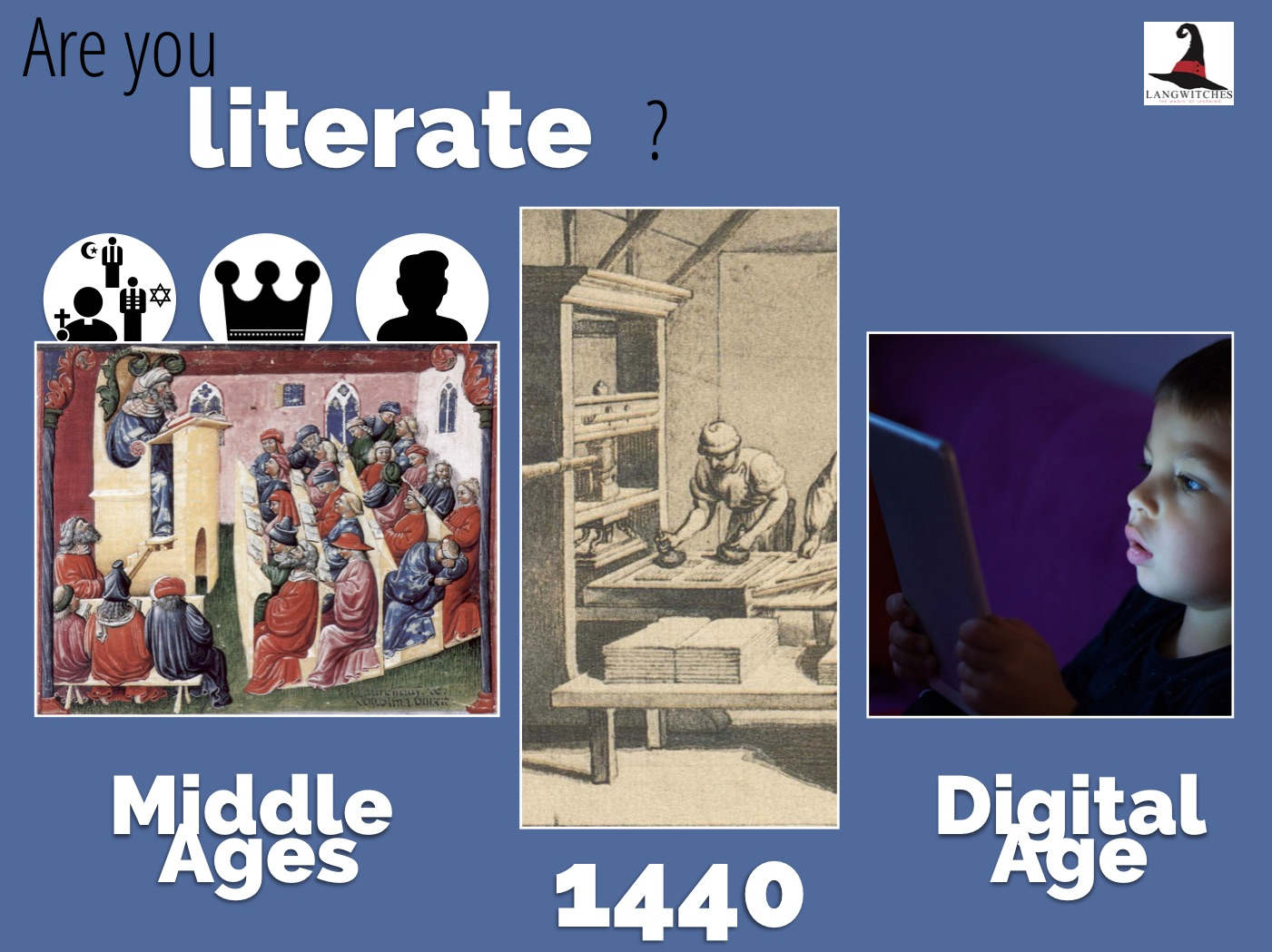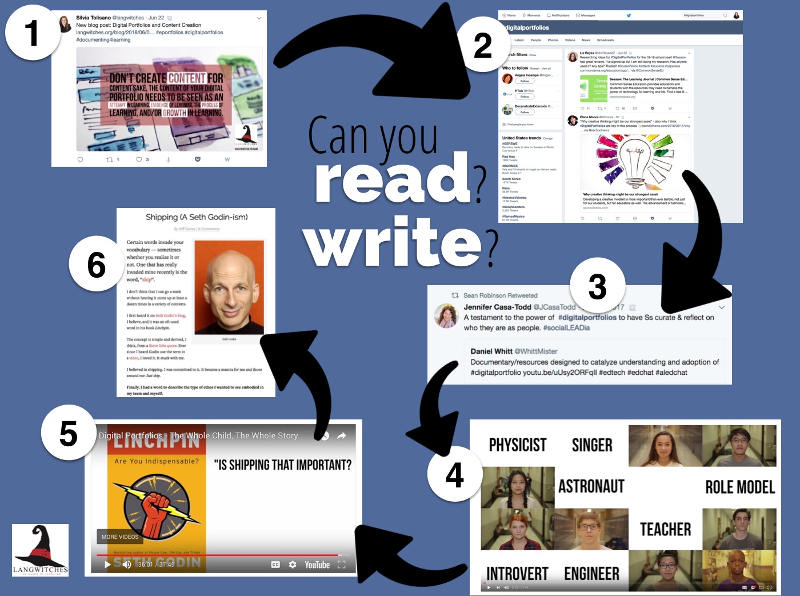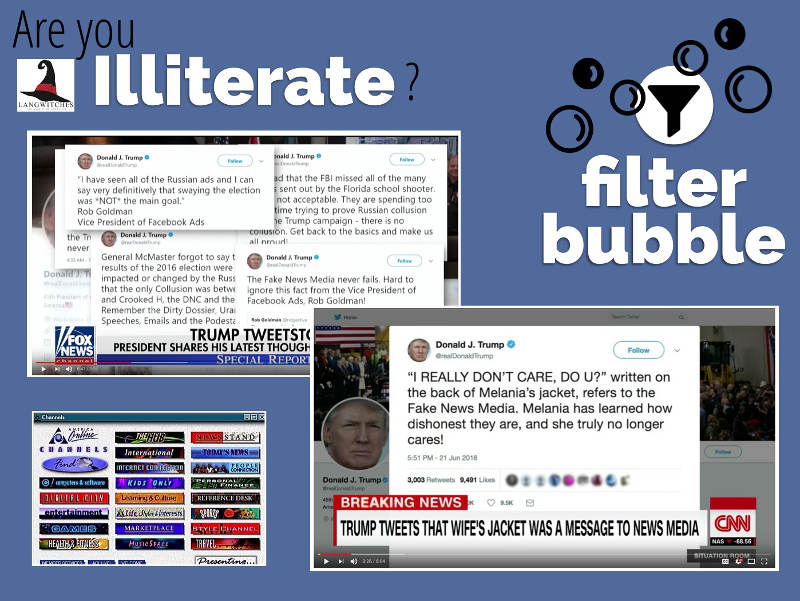Our Notion of Being Literate or Illiterate Calls for an Update

What does it mean to be literate? What does it mean to be illiterate? I think about the definition and the notion of literacy quite a bit.
I define literacy as the ability to read and write and being able to express and communicate our ideas to others.
Looking back at history, we know that the ability to read and write were in the hands of the clergy (male) and the aristocracy (male) . The common people (and women) were illiterate in the basic notion of being able to read, let alone to communicate in writing. They HAD to rely on the “elite” (and males) to choose (filter) what kind of information they would pass on. By the time they received this information, it had already been manipulated by the literates own agendas, by the literates own perspectives and beliefs, for their advantage and their future plans.
The invention of the printing press by Johannes Gutenberg around 1440, changed everything. Suddenly print was able to be duplicated and disseminated like never before. Mass printing made books more affordable and more topics were being printed. Information now did not only come from the church or the noble class, it was accessible to many more directly with the ability to read.

I believe we are at a moment in time and history where there is a new gap forming between literate and illiterate. Ask yourself, on which side you consider yourself to be on? Can you read? Can you write? Can you express and communicate your ideas effectively?
Can you read a tweet (1) that mentions a hashtag? Can you follow and continue reading a conversation that is ongoing via that hashtag (2)? Can you continue the thread of the conversation (3) by following the link to a video (4) that mentions a book (5)? Can you research an unknown word from that book (mentioned in the video) that was introduced and is being frequently used in that book?

Can you read non-linear, transmedia and across multiple platforms? Do you have access to a network that will funnel and filter information in the age of information overload? Do you understand the mechanics of fake news campaigns in order to recognize characteristics? Are you trapped in a filter bubble, receiving only information that “can result from personalized searches when a website algorithm selectively guesses what information a user would like to see based on information about the user, such as location, past click-behavior and search history.”?
Tools and ideas to transform education. Sign up below.
[Digital Portfolios and Content]
The gap between literate and illiterate in digital spaces started way back, when the Internet and World Wide Web were young. Do you remember AOL? Remember their initial screen when you first logged on? Remember that they tried to make it easy for these new Internet users to find their way and to get to their news. They chose to filter what type of information would be displayed, what topics users could choose from. Instead of learning to read and write, the “common folk” took the easy way to have someone create a portal for them and make these choices for them.
Fast forward 25 years and we can continue to observe how some (many?) can’t read from a digital source/platform. News channels are more and more sharing screenshots of tweets (for example) and are then proceeding to interprete, connect and manipulate them for their own agendas. They pre-chew selected information in order to then present that information in their own light.
When people solely rely on others to choose what to see and read, they relinquish their right to find, filter, interpret, analyze and make up their own mind. When people don’t have the skills and the ability to read, write, communicate and express their ideas, they have become illiterate!

The skills to READ on digital platforms (including social media networks) are just one of the skills that allow you to consider yourself literate in 2018. What about the ability to WRITE in digital spaces? How developed are you skills? Do you know how to write hyperlinked? How fluent are you in reading and writing in digital spaces?
As we shift and extend our notion of what it means to be literate, we have to acknowledge that merely reading and writing in text form and on analog platforms is simply not enough to call yourself literate. The skills and abilities MUST include reading and writing in various media forms and on multiple platforms INCLUDING digital spaces. We can’t continue to differentiate between our analog and digital world. We live in ONE world after all.
cross posted at langwitches.org/blog
Silvia Tolisano is a Curriculum21 faculty member, author of the book Digital Storytelling Tools for Educators and founder of the Around the World with 80 Schools project. Read more at langwitches.org/blog
